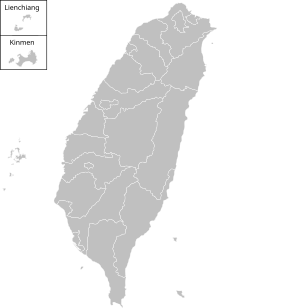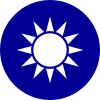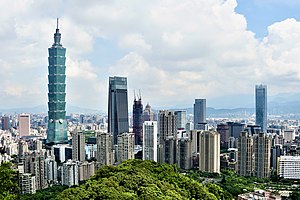Taiwan: Difference between revisions
No edit summary |
(Adding two more overview paragraphs) |
||
| (2 intermediate revisions by the same user not shown) | |||
| Line 24: | Line 24: | ||
| population_density_rank = | | population_density_rank = | ||
| population_densitymi²= | | population_densitymi²= | ||
| currency = | | currency = New Taiwan Dollar | ||
| currency_code= NT | | currency_code= NT | ||
| HDI = | | HDI = | ||
| Line 40: | Line 40: | ||
[[File:Taipei Skyline 2022.06.29.jpg|thumb|right|Taipei, capital city of Taiwan.]] | [[File:Taipei Skyline 2022.06.29.jpg|thumb|right|Taipei, capital city of Taiwan.]] | ||
'''Taiwan''' (traditional [[Chinese language|Chinese]] 臺灣 or 台灣, simplified Chinese 台湾; pinyin ''Táiwān'') officially the Republic of China (ROC), is a country in [[East Asia]]. The main island was previously known as ''Formosa'', from [[Portuguese language|Portuguese]], and is located about 60 miles west of the [[Japan]]ese [[Ryukyu Islands]] and about 70 miles from the | '''Taiwan''' (traditional [[Chinese language|Chinese]] 臺灣 or 台灣, simplified Chinese 台湾; pinyin ''Táiwān'') officially the Republic of China (ROC), is a country in [[East Asia]]. The main island was previously known as ''Formosa'', from [[Portuguese language|Portuguese]], and is located about 60 miles west of the [[Japan]]ese [[Ryukyu Islands]] and about 70 miles from the southeastern coast of mainland China. The [[capital (city)|capital]] is [[Taipei]] (台北市 ''Táiběi Shì''). The combined territories under ROC control consist of 168 islands in total covering 13,974 square miles (36,193 square kilometres). The largest metropolitan area is formed by Taipei (the capital), New Taipei City, and Keelung. With around 23.9 million inhabitants, Taiwan is among the most densely populated countries. | ||
Taiwan has been settled for at least 25,000 years. In the 17th century, Han Chinese immigration began under a Dutch colony and continued under the Kingdom of Tungning. The island was annexed in 1683 by the Qing dynasty of China and ceded to the Empire of Japan in 1895. The Republic of China, which had overthrown the Qing in 1912, took control following the surrender of Japan at the end of World War II in 1945. Japan renounced sovereignty over Taiwan in 1952. The immediate resumption of the Chinese Civil War resulted in the loss of the Chinese mainland to Communist forces, who established the People's Republic of China, and the flight of the ROC central government to Taiwan in 1949. | |||
Taiwan's political and economic situation contrasts sharply with mainland China. The island has seen a transition to [[democracy]], with a president elected under popular suffrage and an elected body commonly referred to as a [[parliament]]. Taiwanese people are able to travel to most countries on [[passport]]s bearing the name | In the early 1960s, Taiwan entered a period of rapid economic growth and industrialization called the "Taiwan Miracle". From the late 1980s to early 1990s, the ROC transitioned from a one-party state under martial law to a multiparty democracy. Taiwan's export-oriented industrial economy is the 21st-largest in the world by nominal GDP, with a focus on steel, machinery, electronics, and chemicals manufacturing. Taiwan is classified by the World Bank as a high-income country. It is ranked highly in terms of civil liberties, healthcare, and human development. | ||
The Republic of China is not recognised by most countries, but relations are conducted through unofficial channels. The government on Taiwan once held the Chinese seat on the [[United Nations Security Council]], and thus was internationally recognised, but in 1972 the organisation gave it to the [[People's Republic of China]] (PRC), the state on mainland China. Taiwan has lost much official recognition since then. The split between the PRC and ROC occurred in 1949 following the [[Communism|Communist]] revolution during the Chinese Civil War; having initially governed much of the country, the [[Republic of China (1912-1949)|nationalist ROC]] withdrew to Taiwan and its islands. Although the PRC claims Taiwan as its 23rd province, in practice it has never administered the territories, and there is strong support on Taiwan for outright independence. | |||
President Lai Ching-te, also known as William Lai, is Taiwan's eighth president and was elected in 2024. He favors preserving the status quo in regard to the political status of Taiwan, arguing that it is already an independent state under the name "Republic of China" that is not subordinate to the People's Republic of China (PRC). | |||
Taiwan's political and economic situation contrasts sharply with mainland China. The island has seen a transition to [[democracy]], with a president elected under popular suffrage and an elected body commonly referred to as a [[parliament]]. Taiwanese people are able to travel to most countries on [[passport]]s bearing the name "Republic of China". | |||
==Economy== | ==Economy== | ||
Taiwan's economy is one of the so-called | Taiwan's economy is one of the so-called Asian Tigers, with its own currency, the New Taiwan dollar. | ||
In 2022, Taiwan's GDP (Gross Domestic Product) was around 760.91 billion U.S. dollars. The service sector generates the highest shares of its GDP at around 62%, while the industry sector contributes about 35%.<ref>https://www.statista.com/statistics/727589/gross-domestic-product-gdp-in-taiwan/#:~:text=In%202022%2C%20Taiwan's%20gross%20domestic,billion%20U.S.%20dollars%20by%202029.</ref> | |||
Taiwan is a key player in the supply chain for advanced semiconductors. Taiwan's rise in the semiconductor industry is largely attributed to Taiwan Semiconductor Manufacturing Co. (TSMC) and United Microelectronic Corporation (UMC). As of December 2021, the market capitalization of TSMC equated to roughly 90% of Taiwan's GDP, making it one of the top 10 largest publicly traded companies in the world. | |||
==Footnotes== | ==Footnotes== | ||
{{reflist|2}} | {{reflist|2}} | ||
Latest revision as of 06:14, 12 September 2024
| Republic of China 中華民國 | |
|---|---|

| |
 
| |
| National anthem | National Anthem of the Republic of China, National Flag Anthem of the Republic of China |
| Capital | Taipei |
| Largest city | New Taipei City |
| Official language | Chinese |
| Government type | Unitary semi-presidential republic[1][2] |
| President | Lai Ching Teck |
| Currency | New Taiwan Dollar (NT) |
| Time zone | UTC (UTC+8) |
| Country codes | Internet TLD : .tw Calling code : +886 |
Taiwan (traditional Chinese 臺灣 or 台灣, simplified Chinese 台湾; pinyin Táiwān) officially the Republic of China (ROC), is a country in East Asia. The main island was previously known as Formosa, from Portuguese, and is located about 60 miles west of the Japanese Ryukyu Islands and about 70 miles from the southeastern coast of mainland China. The capital is Taipei (台北市 Táiběi Shì). The combined territories under ROC control consist of 168 islands in total covering 13,974 square miles (36,193 square kilometres). The largest metropolitan area is formed by Taipei (the capital), New Taipei City, and Keelung. With around 23.9 million inhabitants, Taiwan is among the most densely populated countries.
Taiwan has been settled for at least 25,000 years. In the 17th century, Han Chinese immigration began under a Dutch colony and continued under the Kingdom of Tungning. The island was annexed in 1683 by the Qing dynasty of China and ceded to the Empire of Japan in 1895. The Republic of China, which had overthrown the Qing in 1912, took control following the surrender of Japan at the end of World War II in 1945. Japan renounced sovereignty over Taiwan in 1952. The immediate resumption of the Chinese Civil War resulted in the loss of the Chinese mainland to Communist forces, who established the People's Republic of China, and the flight of the ROC central government to Taiwan in 1949.
In the early 1960s, Taiwan entered a period of rapid economic growth and industrialization called the "Taiwan Miracle". From the late 1980s to early 1990s, the ROC transitioned from a one-party state under martial law to a multiparty democracy. Taiwan's export-oriented industrial economy is the 21st-largest in the world by nominal GDP, with a focus on steel, machinery, electronics, and chemicals manufacturing. Taiwan is classified by the World Bank as a high-income country. It is ranked highly in terms of civil liberties, healthcare, and human development.
The Republic of China is not recognised by most countries, but relations are conducted through unofficial channels. The government on Taiwan once held the Chinese seat on the United Nations Security Council, and thus was internationally recognised, but in 1972 the organisation gave it to the People's Republic of China (PRC), the state on mainland China. Taiwan has lost much official recognition since then. The split between the PRC and ROC occurred in 1949 following the Communist revolution during the Chinese Civil War; having initially governed much of the country, the nationalist ROC withdrew to Taiwan and its islands. Although the PRC claims Taiwan as its 23rd province, in practice it has never administered the territories, and there is strong support on Taiwan for outright independence.
President Lai Ching-te, also known as William Lai, is Taiwan's eighth president and was elected in 2024. He favors preserving the status quo in regard to the political status of Taiwan, arguing that it is already an independent state under the name "Republic of China" that is not subordinate to the People's Republic of China (PRC).
Taiwan's political and economic situation contrasts sharply with mainland China. The island has seen a transition to democracy, with a president elected under popular suffrage and an elected body commonly referred to as a parliament. Taiwanese people are able to travel to most countries on passports bearing the name "Republic of China".
Economy
Taiwan's economy is one of the so-called Asian Tigers, with its own currency, the New Taiwan dollar.
In 2022, Taiwan's GDP (Gross Domestic Product) was around 760.91 billion U.S. dollars. The service sector generates the highest shares of its GDP at around 62%, while the industry sector contributes about 35%.[3]
Taiwan is a key player in the supply chain for advanced semiconductors. Taiwan's rise in the semiconductor industry is largely attributed to Taiwan Semiconductor Manufacturing Co. (TSMC) and United Microelectronic Corporation (UMC). As of December 2021, the market capitalization of TSMC equated to roughly 90% of Taiwan's GDP, making it one of the top 10 largest publicly traded companies in the world.
Footnotes
- ↑ (1 July 2006) "Is Taiwan a Presidential System?" (in fr). China Perspectives 2006 (4). DOI:10.4000/chinaperspectives.1036. ISSN 1996-4617. Research Blogging.
- ↑ Taiwan - Chiang Kai-shek's Government, Democratization, and Constitutional Reforms.
- ↑ https://www.statista.com/statistics/727589/gross-domestic-product-gdp-in-taiwan/#:~:text=In%202022%2C%20Taiwan's%20gross%20domestic,billion%20U.S.%20dollars%20by%202029.
